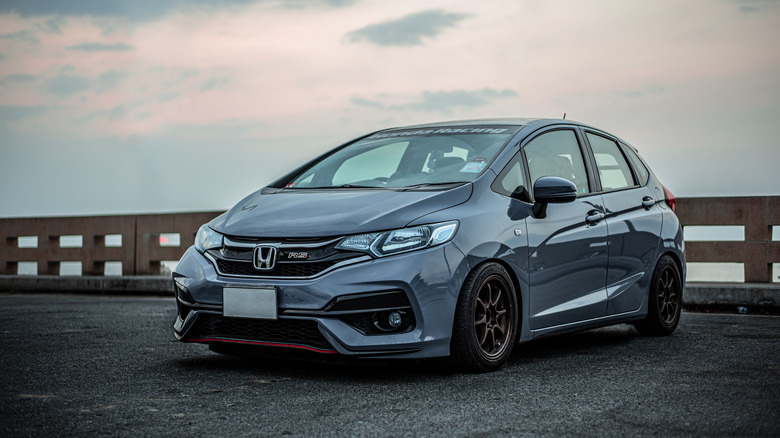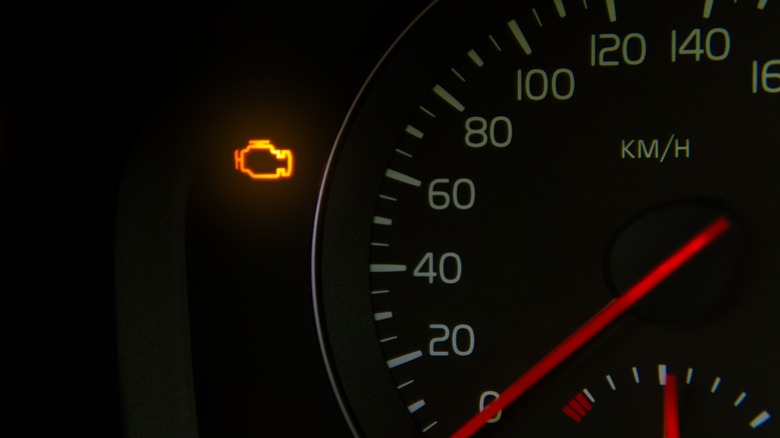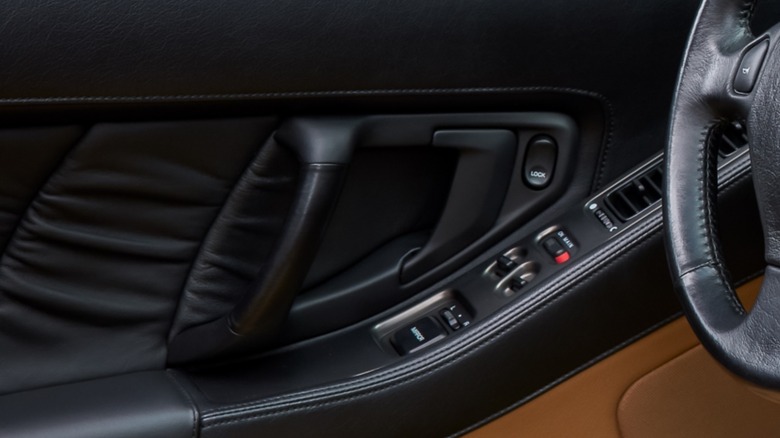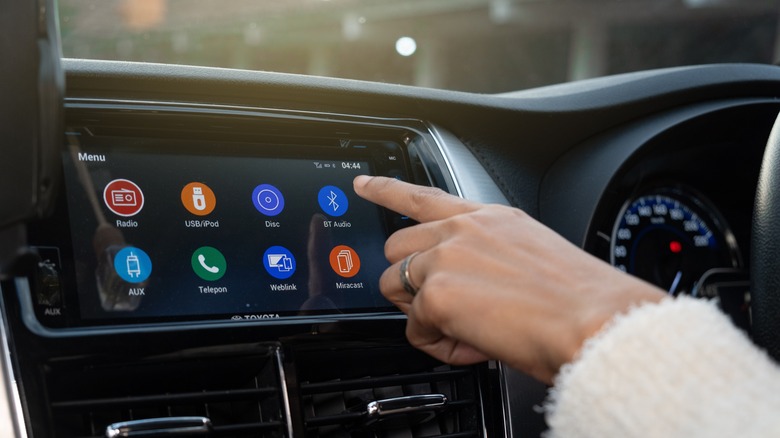Common Problems Your Honda Fit May Have (And The Cost To Fix Them)
In a utopia, drivers never have to worry about maintenance. They can just back the car out of the garage every day, run it ragged, give it a wash every once in a while, and go about their lives. Unfortunately, that's not reality. Sometimes, cars have persistent issues that plague owners continually, bringing them into the shop more often than they prefer. The Honda Fit is one of those cars.
While the Fit is a car that Honda should never have discontinued, it also ranks as one of the Hondas with the most recalls. One severe problem that plagued this little car was faulty airbags — more specifically, the inflators within the airbag deployment system. If they reached certain temperatures or if the environment was too humid, they would explode, with shrapnel flying everywhere when the airbag deployed. Not exactly the safest flaw for a car to have. Luckily, Honda went ahead and repaired that little issue so owners could drive their Fits without concern.
Unfortunately, there were other concerns that drivers commonly encountered with this little economical car. These ailments all have solutions, but a few of them are going to set a Fit owner back a little.
Ignition coil failure
The biggest problem Honda Fit owners saw with their car was the engine light coming on. It might be fun to joke about the Check Engine light turning on and then not doing anything about it for six months, but it can be a serious issue that only gets worse the longer it's ignored. The 2007 model year for the Fit through the 2016 model had issues with its ignition coils.
Faulty coil packs will cause the Fit to stutter while driving because of engine misfires. Ignition coils take the low voltage electricity from the car's battery and convert it to high voltage before sending it to the spark plugs to start the car's engine. If a Honda Fit struggles to turn over, it's likely the ignition coils. It doesn't cost too much to repair. The average cost to replace the ignition coils in a Honda Fit ranges from $140 to about $210. Prices may vary depending on the city and state, and there are always taxes.
Faulty air-fuel sensor
Buyers of the 2007 and 2014 model year Honda Fits had frequent peculiar experiences of their cars stalling or running poorly. Further investigation eventually revealed that the issue originated with a damaged air-fuel sensor. It's unknown why this was a problem in only those two model years, but owners learned the damage was caused by moisture. While some problems with cars can be avoided as long as owners perform regular maintenance within a specific number of miles, that wasn't the case here. A simple drive through a puddle could have been enough to fry the sensor.
Owners would commonly see their Fit get worse gas mileage, stall, idle rough, or it would fail an emissions test. If this happened, it was necessary to replace the oxygen sensor, which could pose a hefty cost. The average price for a replacement sat between $750 and $830. And that was just for the part. Labor for replacing the sensor could cost anywhere from $64 to $81.
Easily broken front arm rest
Driving a car doesn't always require both hands on the wheel at 10 and 2. Sure, it's what's taught in driving school, but realistically, every driver will rest one arm while the other one does all the steering. Sometimes, drivers rest their arms on their lap, the center console, or on the window. However, when the window is up, the armrest on the driver's side door is the common resting spot. After all, it's in the name: Arm-Rest.
Unfortunately, owners of a Honda Fit between 2007 and 2010 may have encountered an issue with the armrest on the front door. If they weren't careful, the armrest would split or crack, causing damage that wasn't easily fixed. In fact, an entirely new door panel is required to repair something like that. It's not impossible to get a new door panel, but they can be expensive. Some can cost almost $600. While there are aftermarket ones that cost half that, it becomes a game of finding ones that fit the Honda Fit ... pun intended.
Fuel filler door doesn't open
Easily the most vital part to have access to of any petroleum-powered vehicle is the fuel tank — more specifically, access to the fuel filler port. It's kind of challenging to keep a car running if it runs out of fuel and the driver can't refuel the tank. Unfortunately, access to the fuel filler port on the Honda Fit has been known to be obstructed.
The 2009, 2010, 2012, and 2014 model years of the Honda Fit are commonly afflicted by the door to the fuel filler not opening properly. Luckily, Honda made a revised fuel-fill push lifter. The part itself only costs roughly $22, but labor is a different story. That varies, depending on the shop the Fit is brought to. If the car is still under warranty, Honda will likely install it at no charge. Hondas come with a 3-year/36,000-mile warranty, but since this was an issue on older Fits, there might be a charge to fix it.
Fails to connect to Bluetooth
Even if your phone has trouble finding devices from time to time, Bluetooth has been a great addition to cars. Being able to connect your phone to the car's audio system has probably single-handedly prevented more thefts than anyone realizes since nobody has to lug around their massive collection of CDs anymore. However, Bluetooth isn't without its own hassles.
Not only can it be a struggle pairing a phone to the car's audio, but the Honda Fit specifically struggled to properly play Bluetooth audio. This would sometimes present as a simple problem with connecting. Other times, the phone would connect to Bluetooth, but it would fail to play anything through the car's speakers. Fortunately, the fix doesn't require taking it into the shop for a replacement part that could possibly cost hundreds of dollars.
Instead, simply unpairing the device from the car, then Eternal Sunshine the device and delete it from the car's memory. Once that's done, re-pair it and everything should be in working order.





